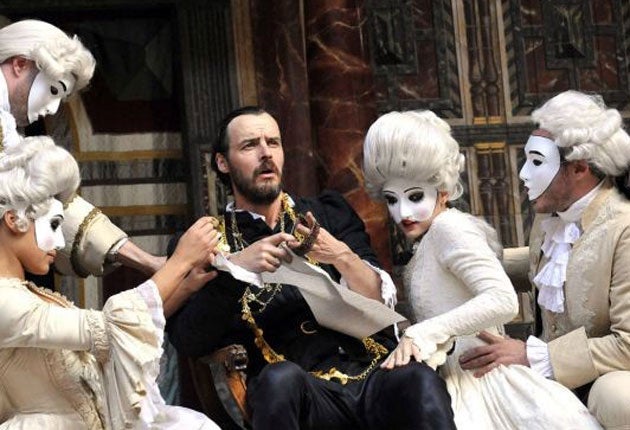Doctor Faustus, Globe Theatre, London

Christopher Marlowe was a great blasphemer, but there's an attractive spiritual ambiguity at the heart of Doctor Faustus, a play that is as much a medieval morality as it is a study of a soul in torment.
Faustus sells his soul to Lucifer's agent, Mephistopheles, in order to live in all voluptuousness for 24 years. But it's an intellectual pact, too: Faustus says he wants to rule the world, but he's more interested in the planetary system, political justice for the Pope's enemies in Germany, and aesthetics.
That world is conjured in Matthew Dunster's fine, lucid production by a chorus of scholars who morph into book-wielding insects and white-masked dancing aristocrats; by fur-clad goats on stilts that secrete bestial headgear; and by a pair of bat-winged dragons that transport Faust and Mephistopheles across Europe to Rome.
In sticking to the earlier 1604 text, Dunster also gives full value to the low-life knockabout, a parallel adventure in which Faust's servant, Wagner (Felix Scott), becomes embroiled in a horse-trading adventure with a phlegmatic clown (Pearce Quigley), a bottle-nosed ostler (Richard Clews) and a crowd of Brueghelesque villagers.
The upper and lower worlds are bound in tricks of magic and transformation – flames in books, horns on heads and one amazing "false" beheading – and nowhere more so than in the parade of the seven deadly sins. Here, Covetousness is a shrieking jewellery queen, Gluttony so fat and farting he can't stand up, and Lust a spreading vamp who consumes them all.
And the uniform of sensuality is that of the devil, too: blacks and reds and the maroon skull caps that are worn by the leading pair. Paul Hilton is not as lyrically magnificent as you'd like, but he has a hard-bitten, restless heroic quality that keeps you hooked, and Arthur Darvill's Mephisto makes of evil the most natural thing in the word.
Helen, the face that launched a thousand ships, is first constructed as a Greek puppet, then humanised by Sarita Piotrowski. At the end, Faustus is trying to start again, the play renewed as a metaphor of mortality. It's the greatest last scene in our drama, and the bells of Southwark Cathedral join the roar of aeroplanes and the smoke-filled auditorium as hell's demons spew forth a tribe of burning, bloody new-born babes.
To 2 October (020 7401 9919)
Join our commenting forum
Join thought-provoking conversations, follow other Independent readers and see their replies
Comments